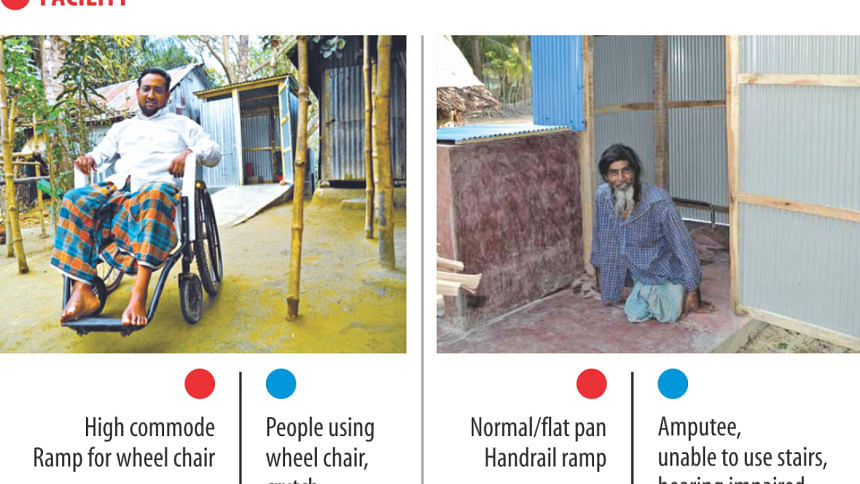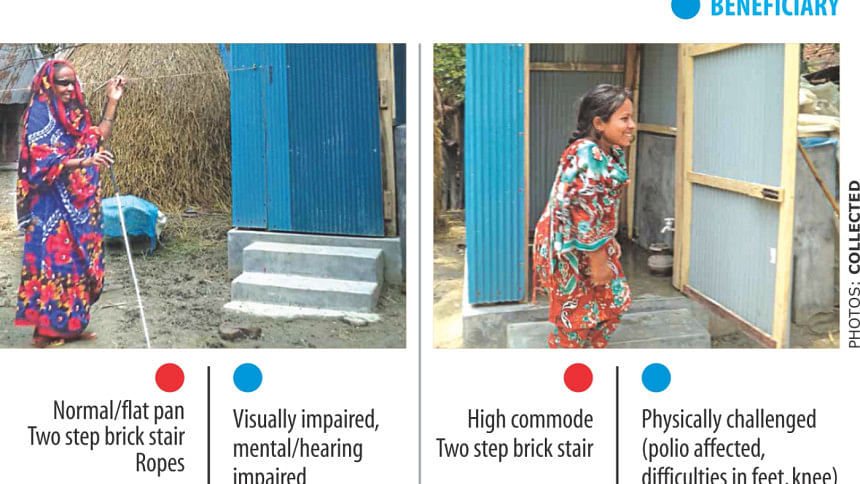Free accessible sanitation for challenged people

A wide scale implementation of constructing accessible toilets for physically challenged people is a must. The government should take up the issue and offer their support
Life has not been easy for Forman Ali. After passing SSC in 2001, he had to quit school and start driving a three-wheeler to support his family.
Amid hardship and in pursuit of betterment, life went on for him. He got married and had two children.
In 2010, misfortune struck Forman again. He had a severe accident, which broke his spinal cord. Due to financial crisis he could not continue his treatment at hospitals and took refuge of herbal medicines. Eventually Forman lost his ability to walk.
“I had to undergo lots of sufferings after the accident. I couldn't do anything without someone's help. It was hard for me to accept since I had always been self-reliant,” said Forman Ali, 31, of Nagarkanda in Faridpur.
“The worst would be to use the toilet. I had to constantly rely on my wife,” he said.
Though Forman was provided with a wheel chair as part of a government programme, which substantially reduced his difficulty in movement, the predicament of using a toilet remained at large, he said.

Then in 2013, he came to know about ADD (Action on Disability and Development), an NGO working for the betterment of people with disabilities in 12 districts, which constructed a bathroom with an easy access for Forman on his house premises, after learning about his condition.
“That changed a lot for me. Ability to use a latrine by myself gave me a sense of independence and helped me to change my outlook,” he said, adding that now he is spending his days teaching local children at his house. “I may not get back the past, but I don't have to depend on others also.”
“ADD International took the initiatives to help people with special needs. We provide four types of house usable latrines from the project fund. The land is provided from the household and they provide some labour support,” said Shafikul Islam, country director of ADD International.
He said according to the Centre for Disability in Development (CDD) 10 percent (16 million) of the overall population in the country is physically challenged and access to sanitation remains one of the major problems.
When asked, if he had any trouble using the toilet, Forman said, “The water tank needs to be filled manually; if there was a pump it would have been easier.”
Contacted, Shafikul said they do not have any plan to set a water pump at this time.
“Hearing the news of my son's accident I went into a coma. When I woke up I couldn't see properly. I lost my vision after a few days,” said Syed Aklima of Gerda union in Faridpur.
“I had to rely on my daughter-in-law all the time. Since ADD installed a disabled-friendly latrine in my house, I can use it on my own,” said a grateful Aklima.
“Problems in access to sanitation for special needs people might change if the government takes necessary steps,” said the country director of ADD.
There are two types of latrines apart from the household ones that ADD constructs, he said. Commode chair ones have been designed especially for children and the community latrine is a two chambered latrine for people to use, he added.
He said social stigma, lack of sanitation, awareness and getting land for community latrines were their initial predicaments. Also constructing in remote coastal areas was a challenge but they have overcome those, he added.
“While using the latrine I had difficulties of even folding my legs,” said Shahida Begum of Rampal in Bagerhat, who was attacked by a fever as a child and could not walk properly afterwards. ADD had installed a latrine with a high commode and a two step brick works stairs at her place recently.
ADD has constructed disabled-friendly latrines in around 480 households, nine community and one school latrines, of them, one is a community-cum-school latrine situated at Mukhail Government Primary School in Bagerhat, where people from the nearby bazaar also use the facility and another is at Bashtoli Polli Unnayan Nimno Madhamic School at Rampal, said Shafikul. The rest are located in Shoronkhola, Gagerhat Sadar, Nagarkanda and Faridpur Sadar.
Shyamoli Mitra, principal of Mukhail Government Primary School in Bagerhat, said her school has around 181 students where ADD has constructed a community latrine two years ago, which has two chambers, one for people with physical disability and the other for general people.
She also mentioned that a motor-controlled water tank would have been much better for them to use as they constantly have to fill up the tanks manually. “Also the commode was constructed with cement, which is hard to clean. It they had used tiles then we did not have to face this issue,” she said, adding, “We have also mentioned this to ADD; hopefully they will do something about it.”
When asked, Shafikul said, “We will take those under consideration and try to implement them for the future projects. Also, at times it is not possible for us to resolve all the issues due to manpower and financial problems.”
“We just took a step to offer better sanitation for the people with disabilities. A wide scale implementation is a must. The government should take up the issue and offer their support,” he said, adding, “People involved in sanitary products and supply business should also get involved and start building these types of latrines.”

 For all latest news, follow The Daily Star's Google News channel.
For all latest news, follow The Daily Star's Google News channel. 



Comments